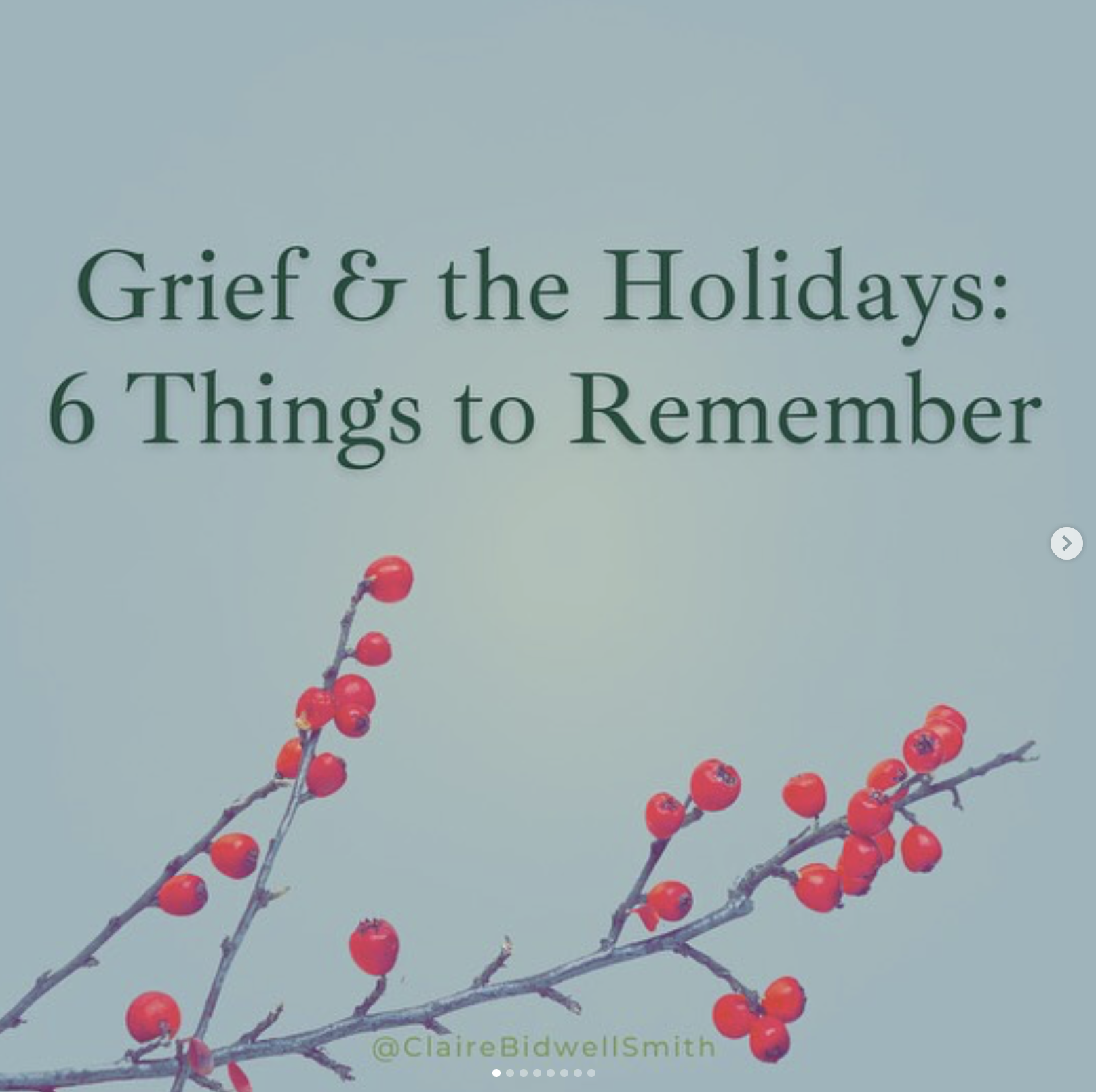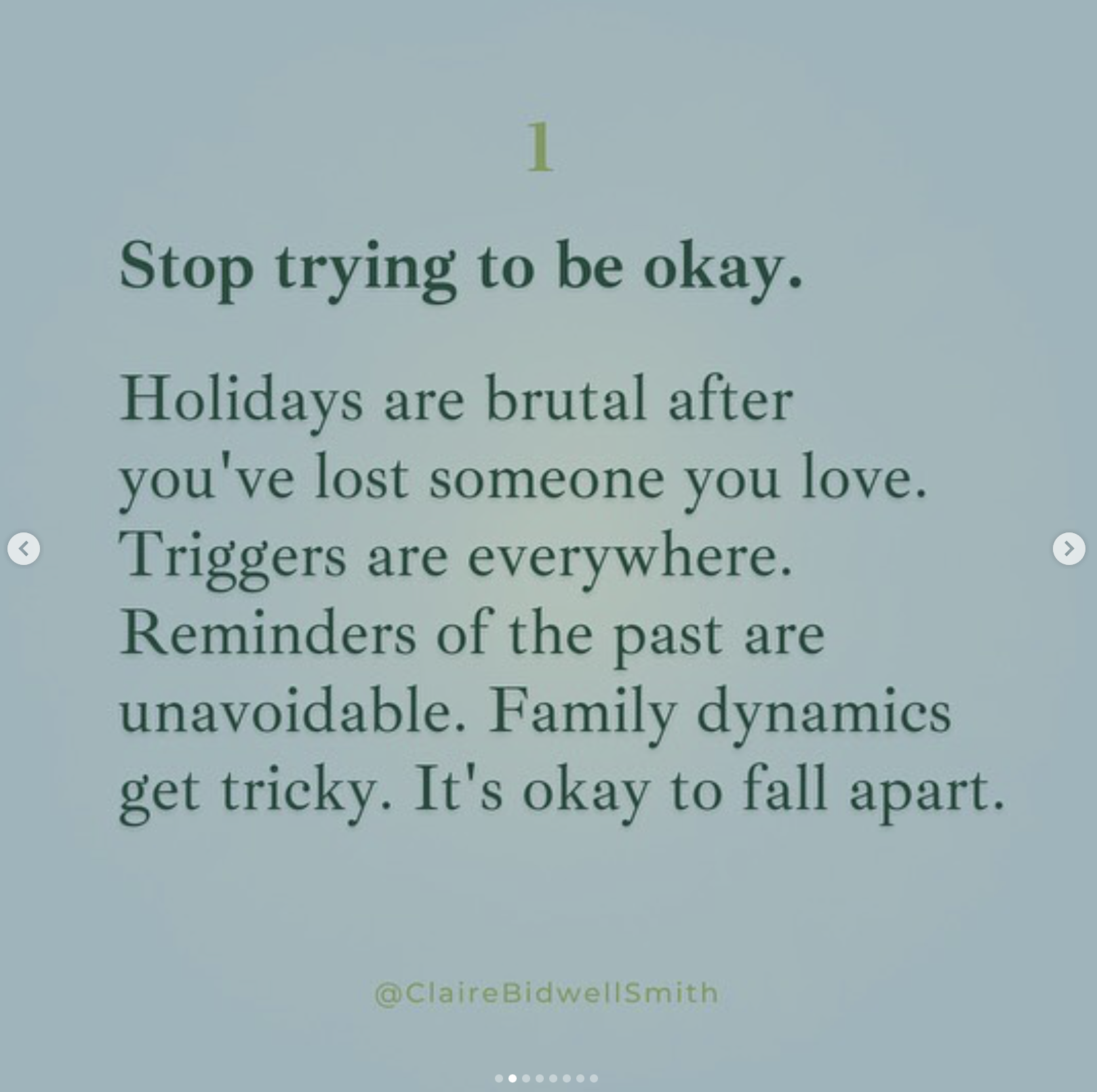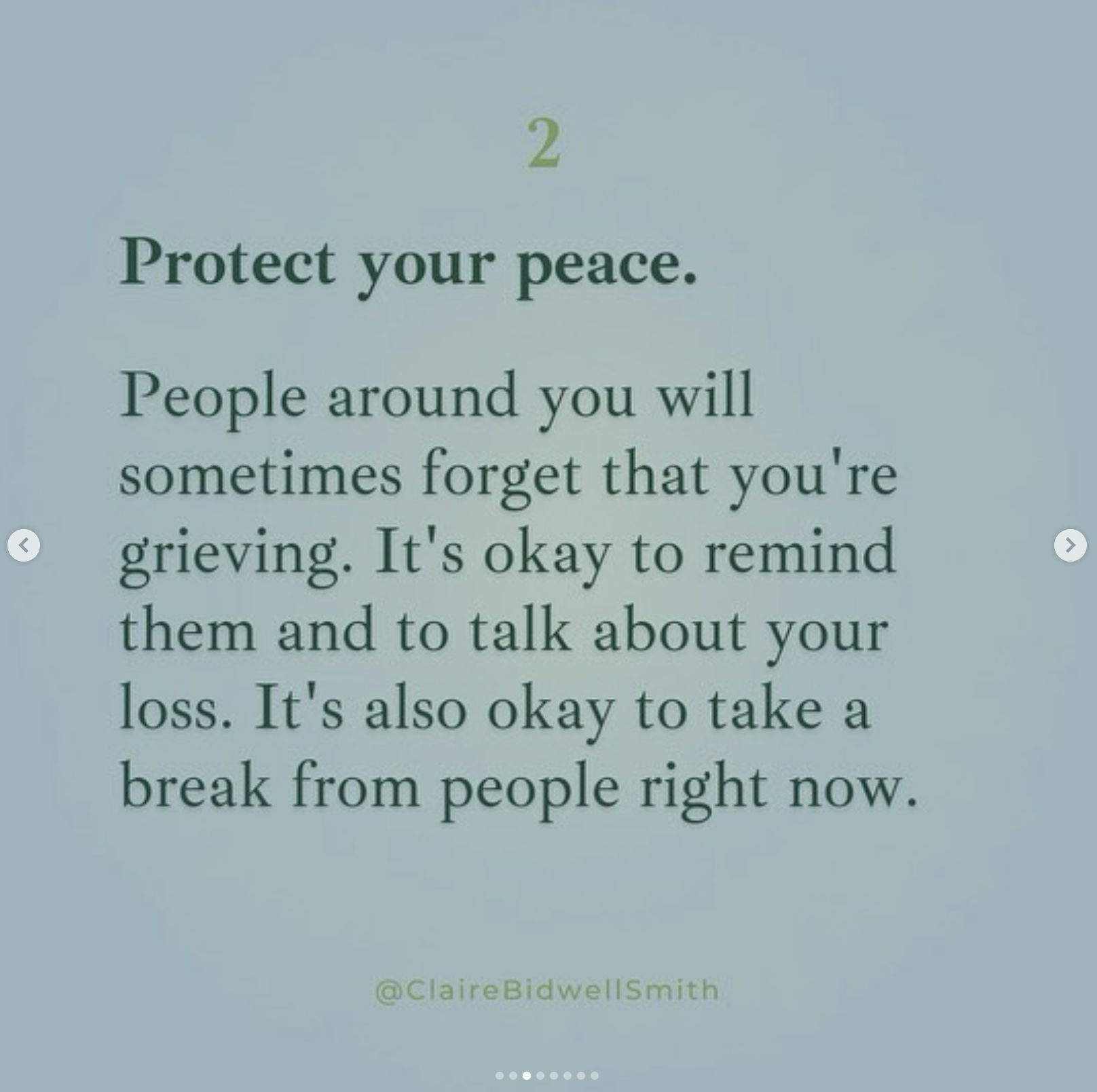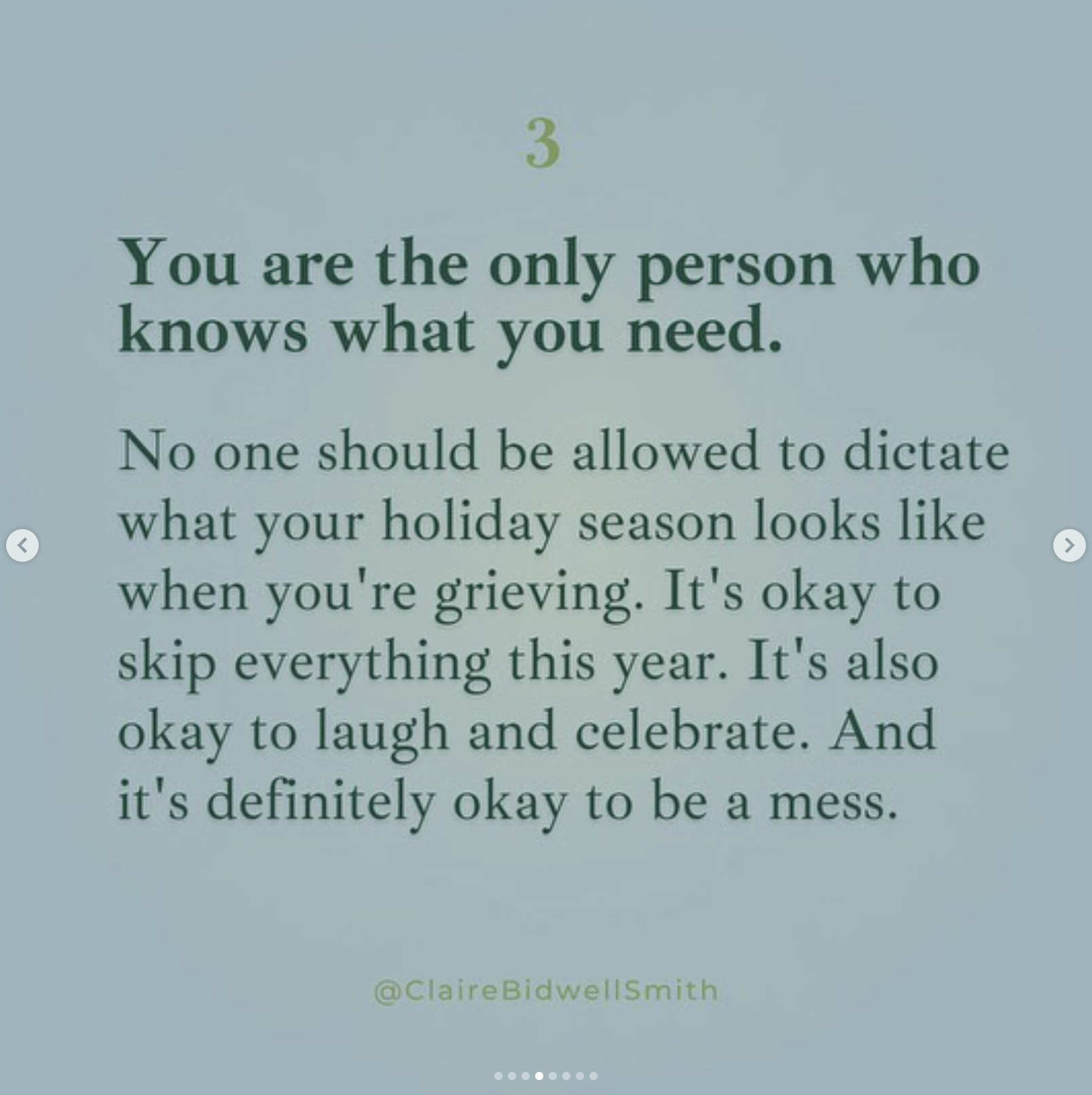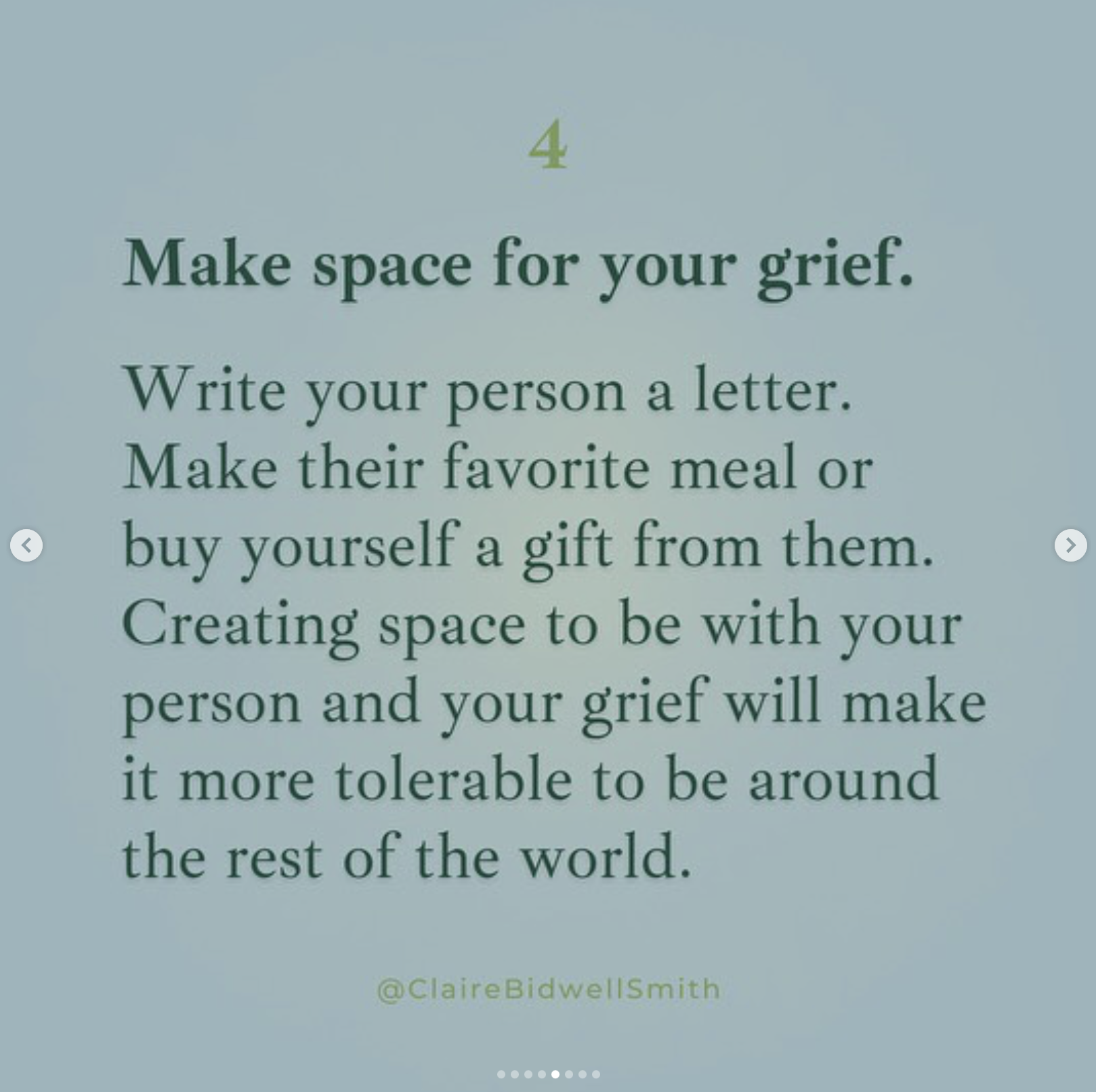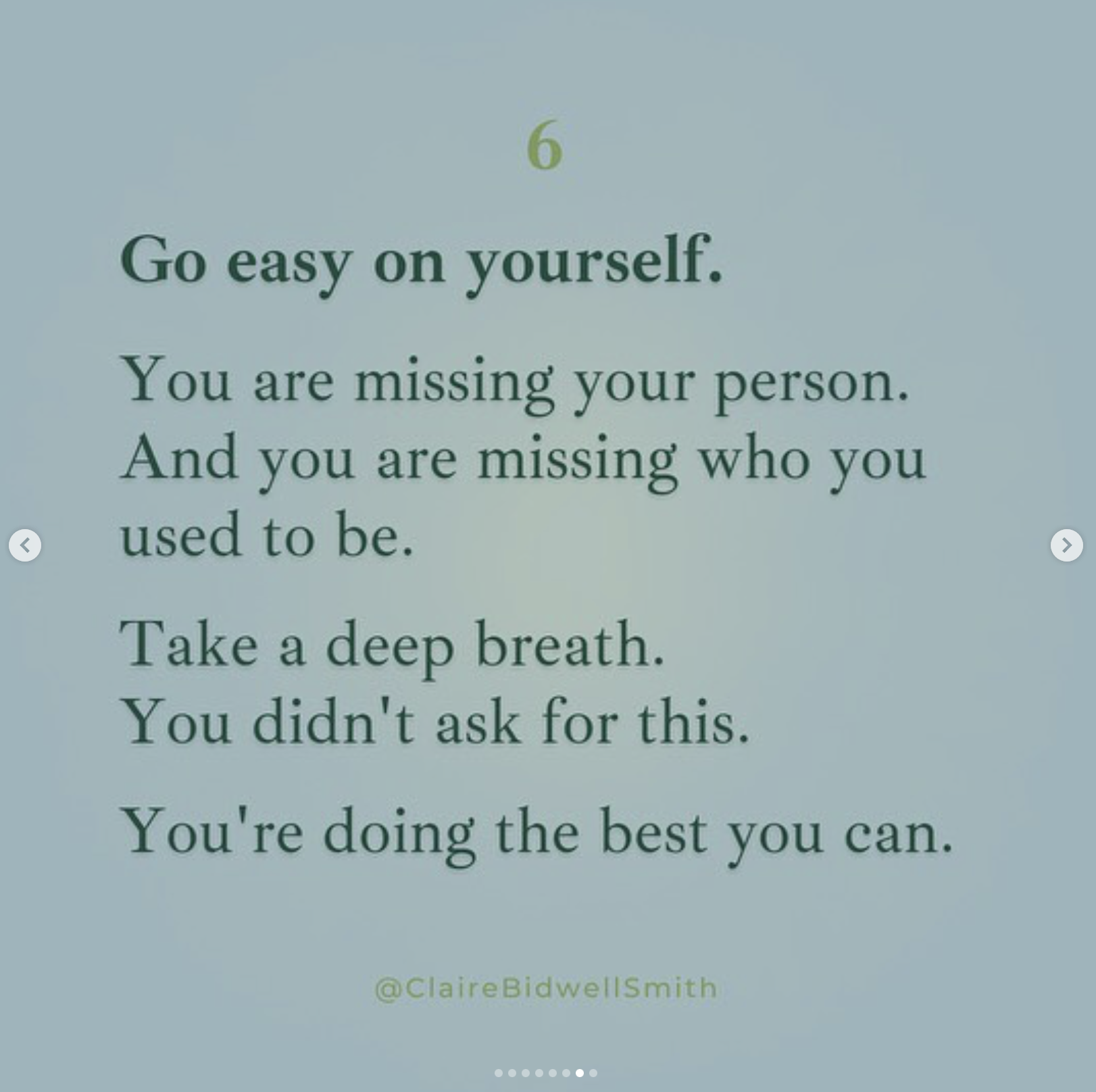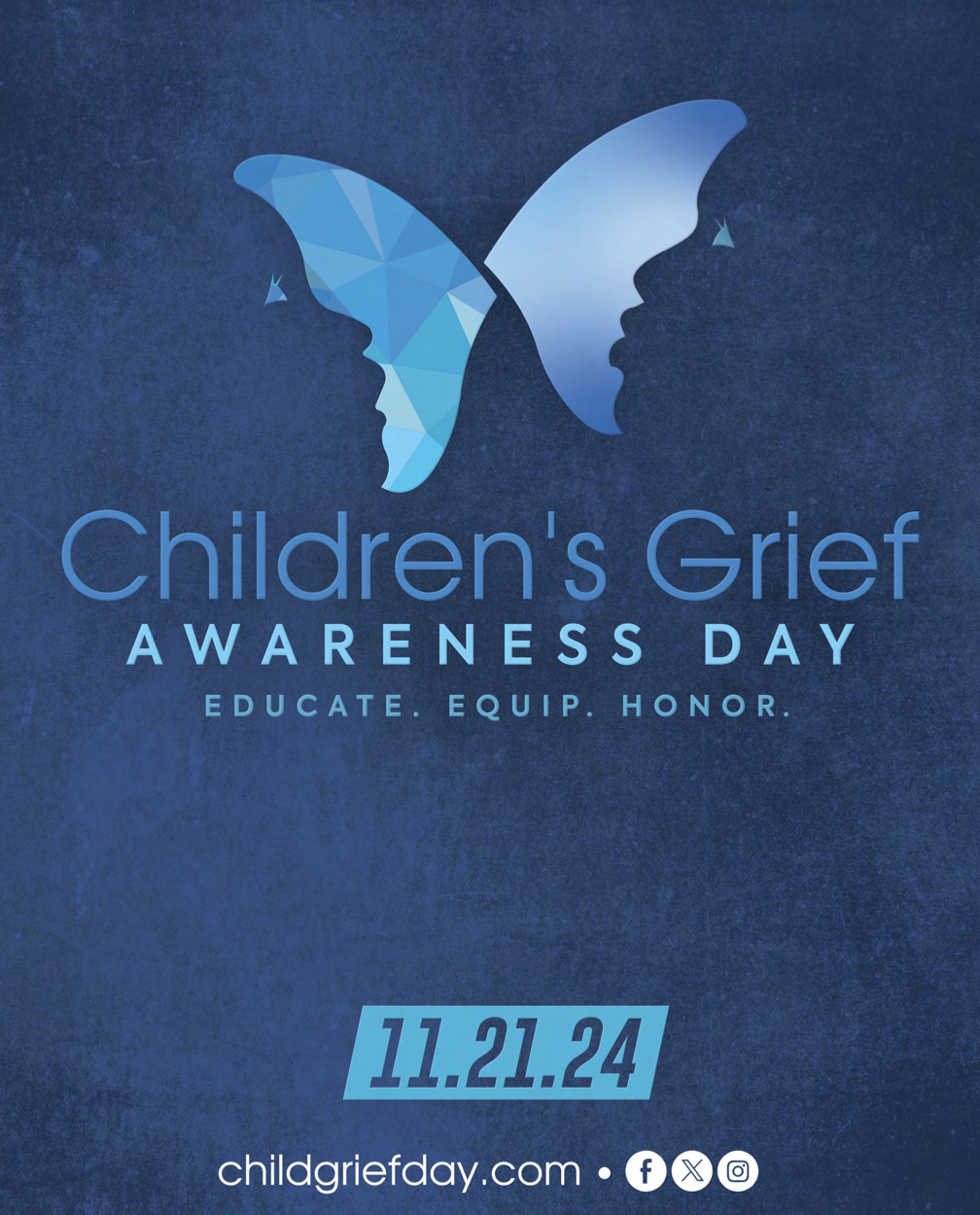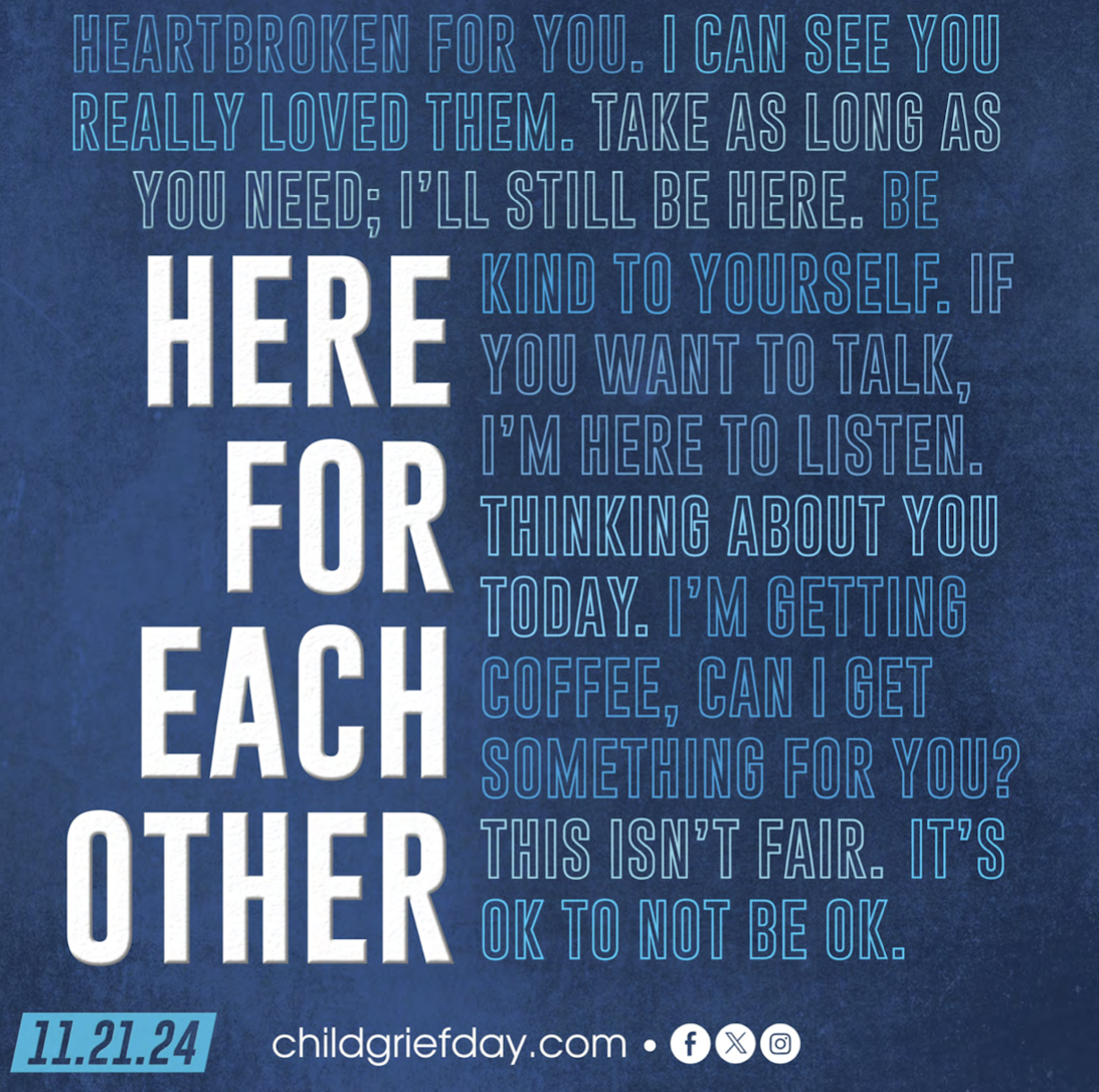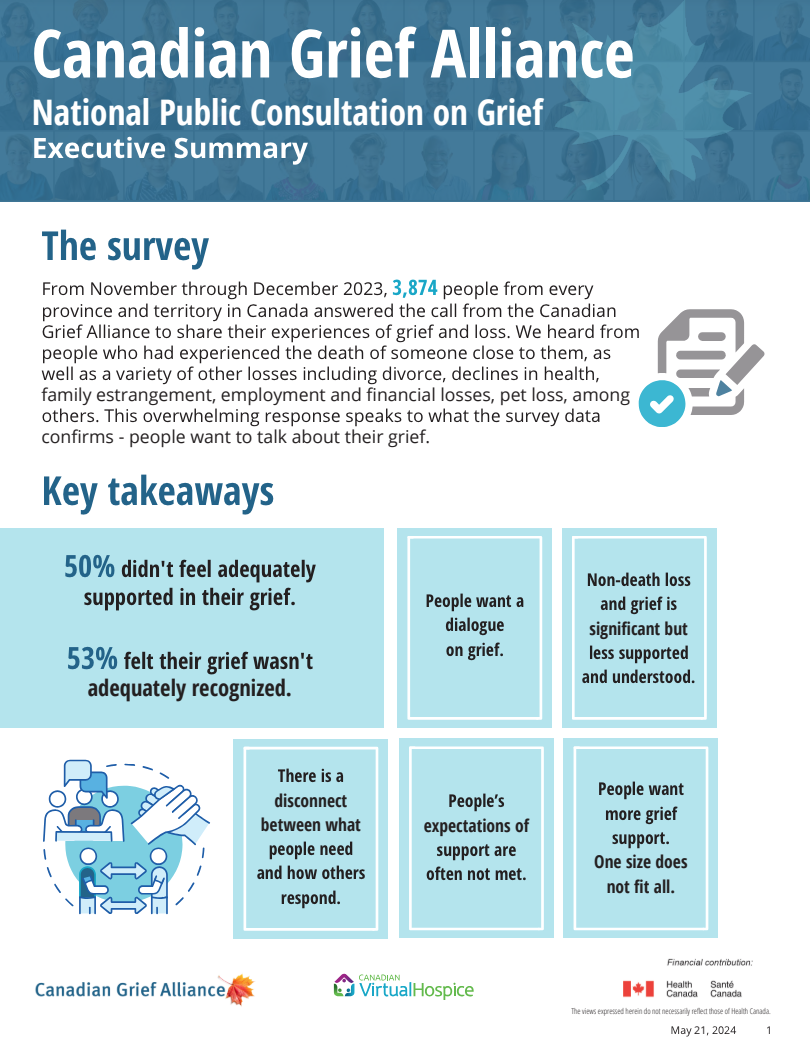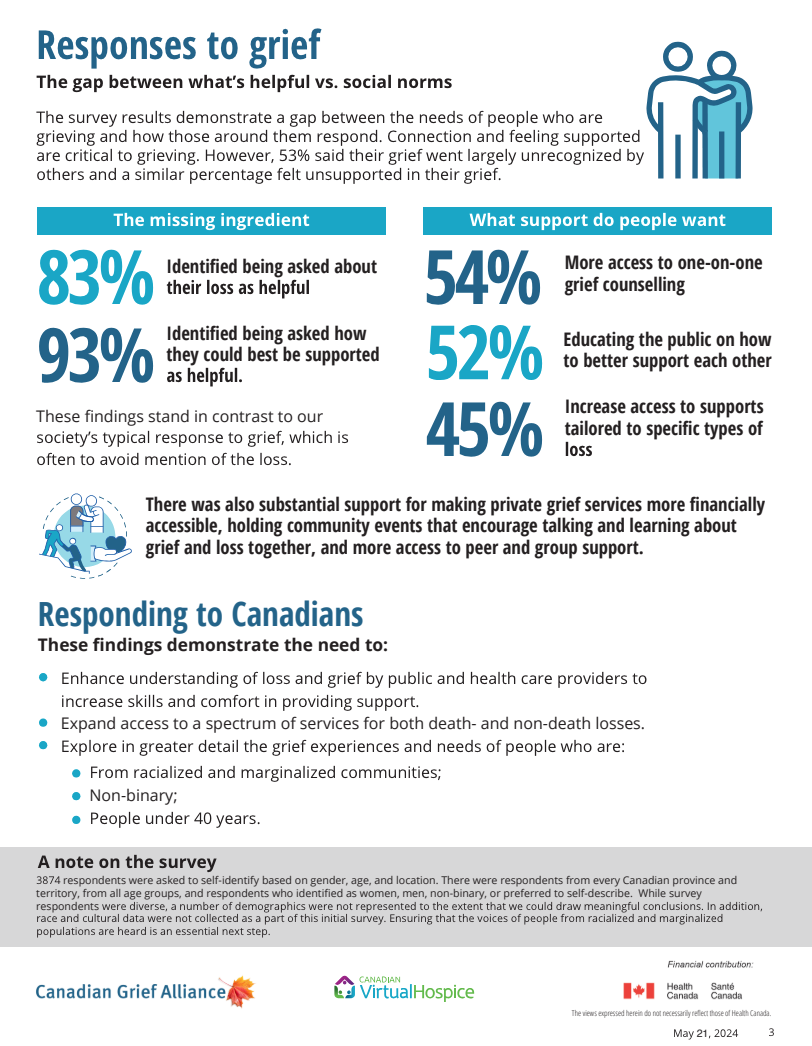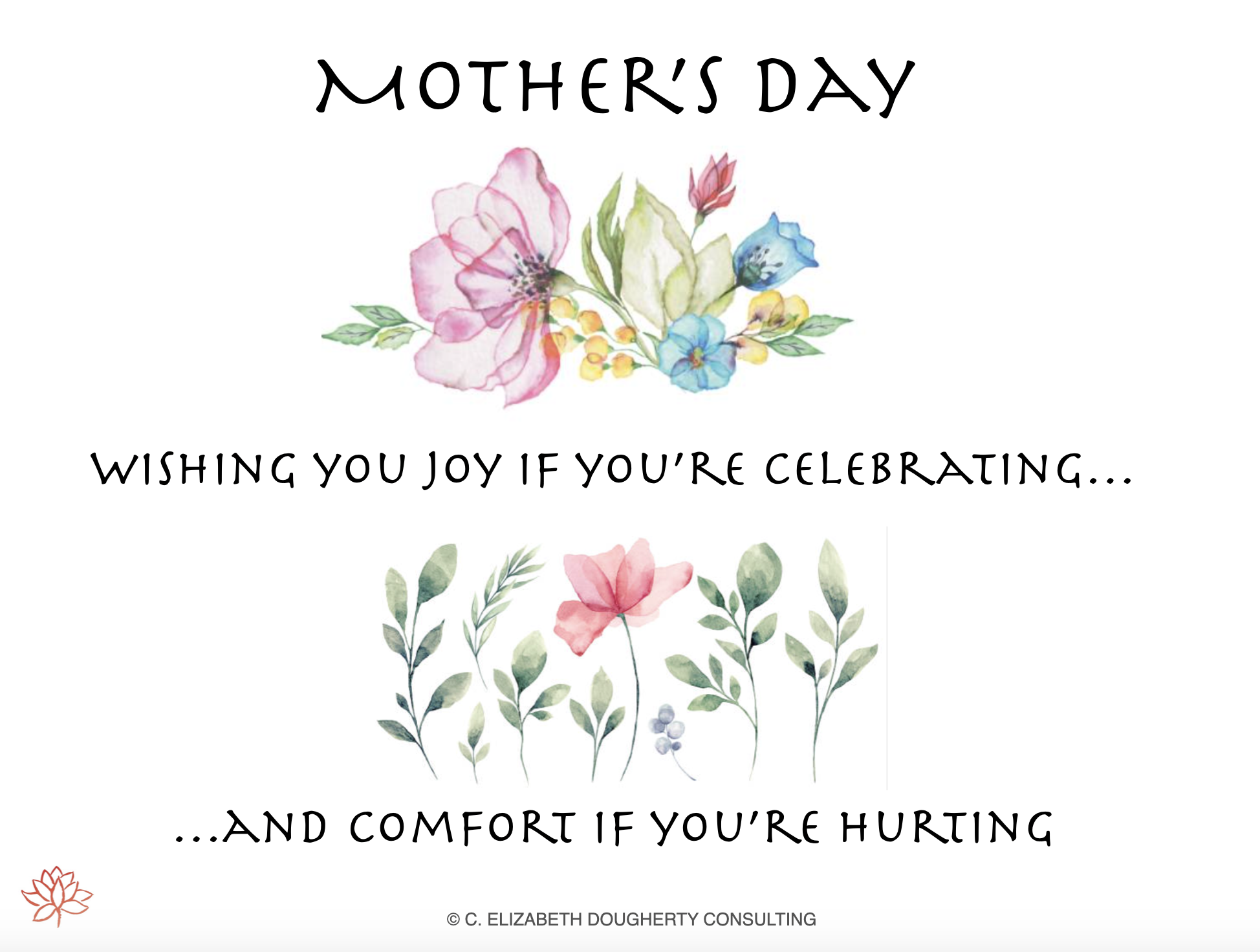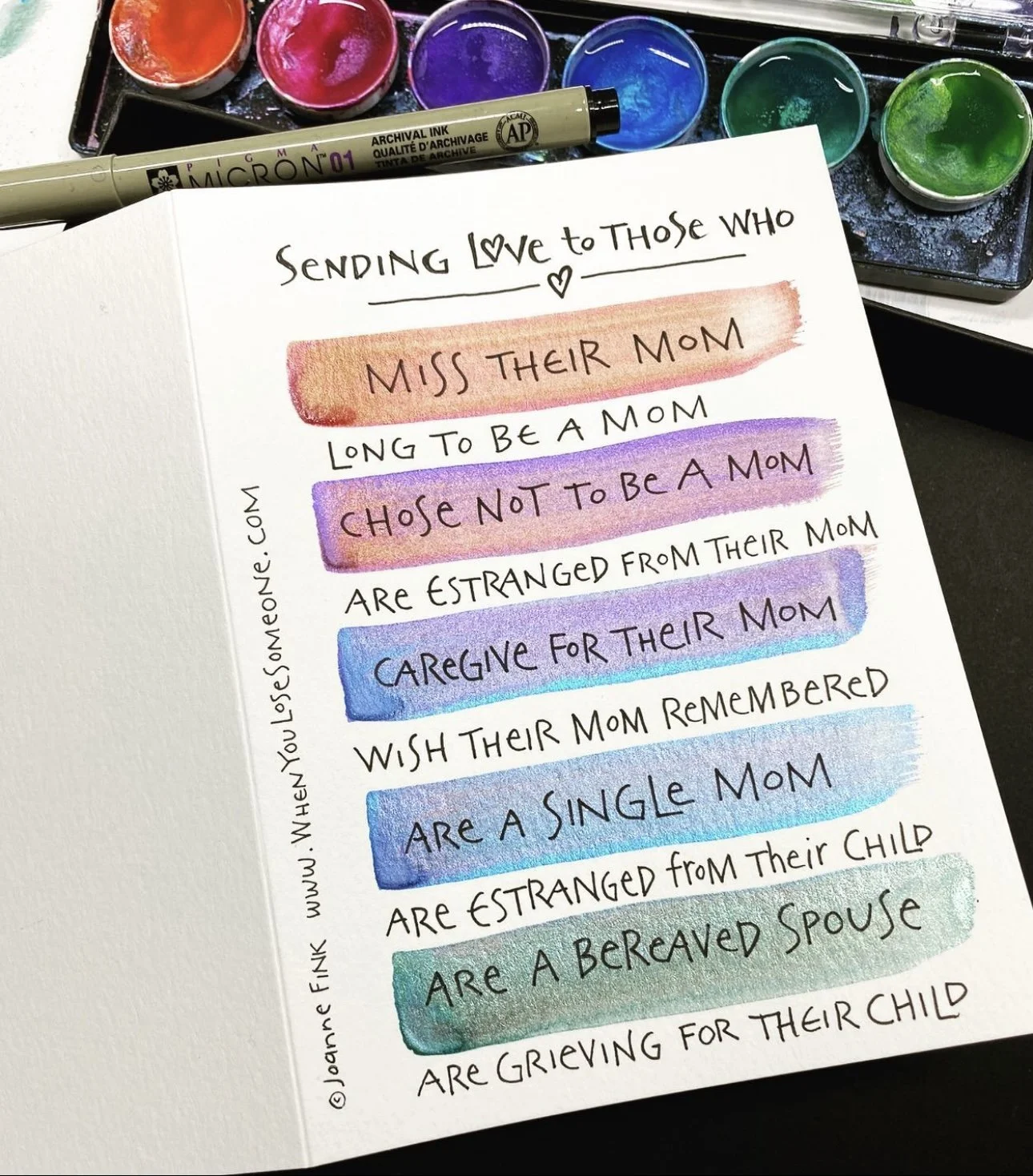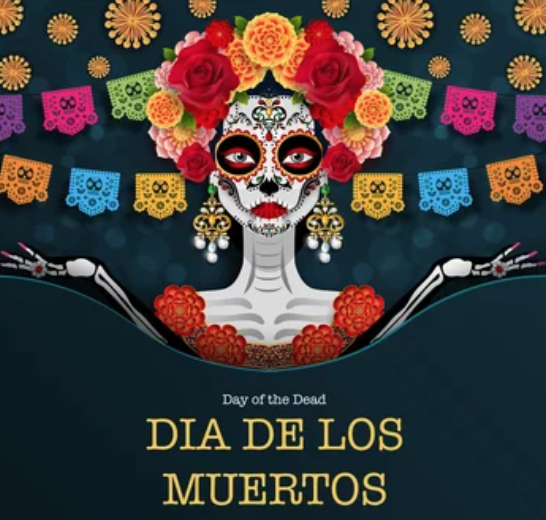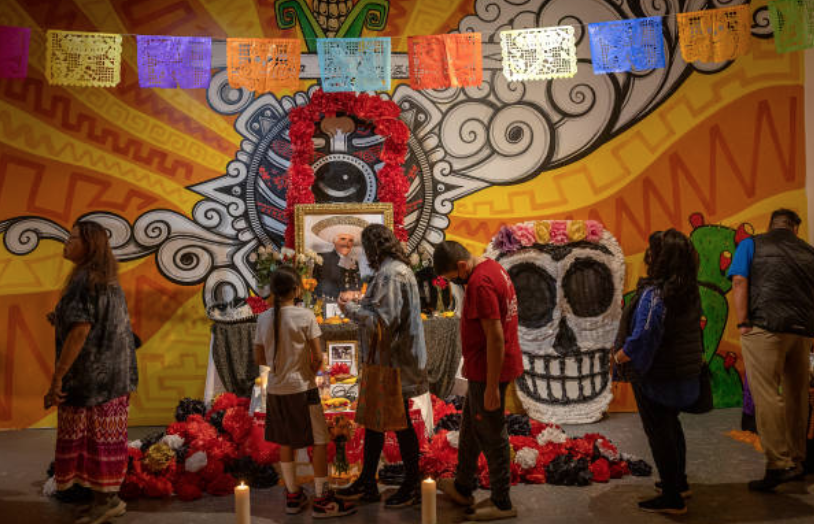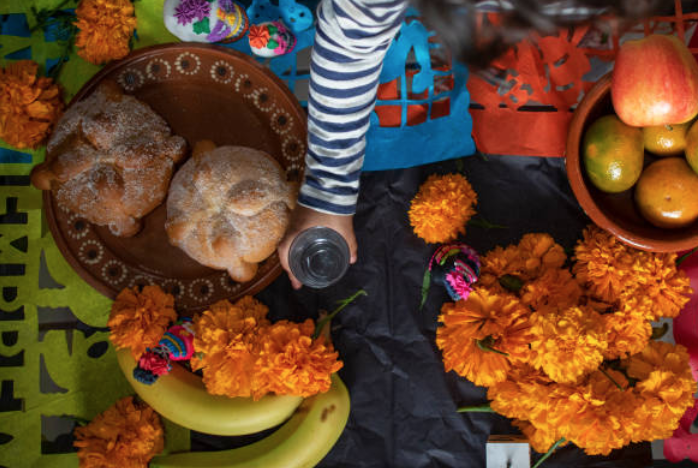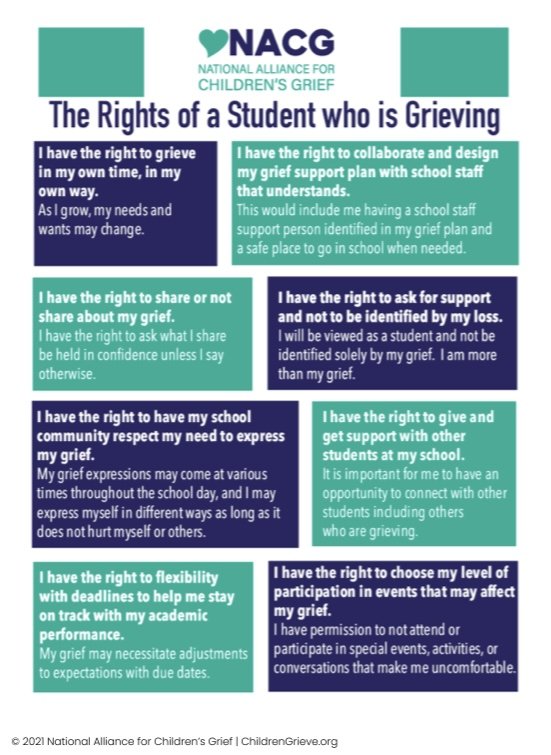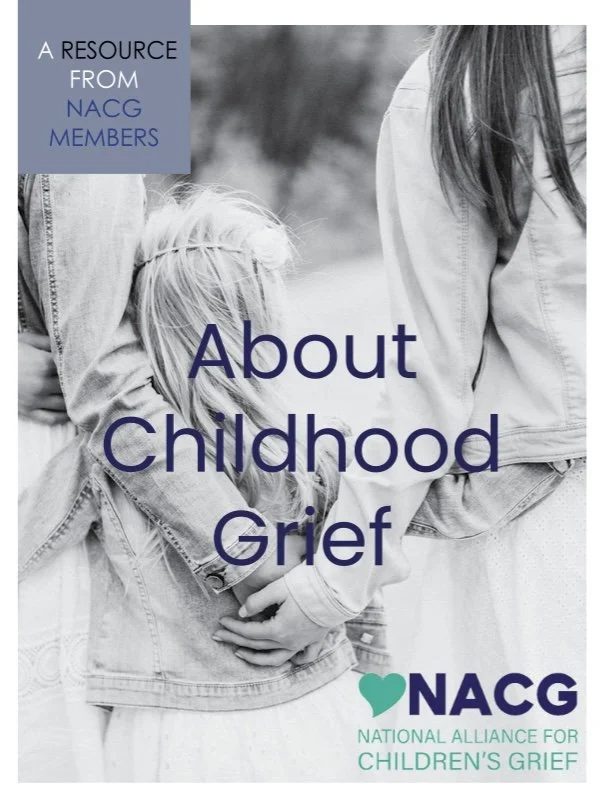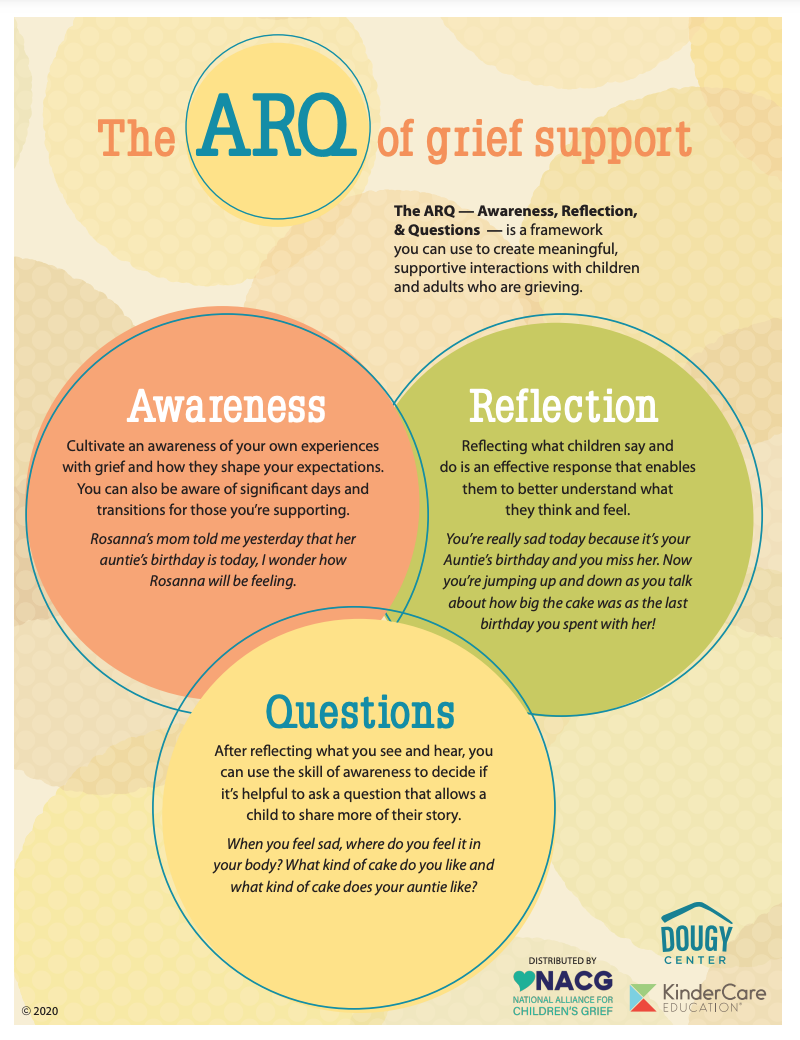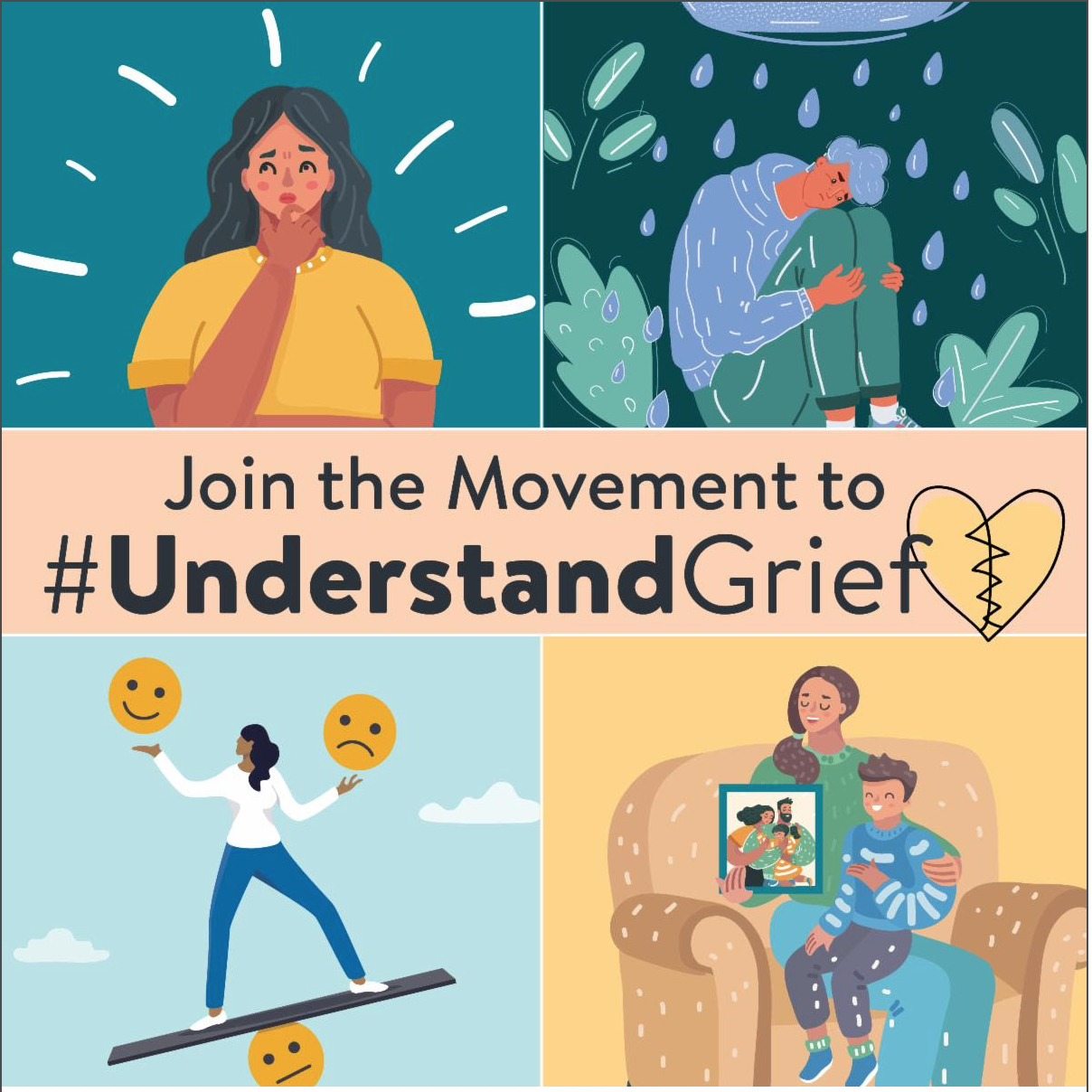In the midst of the focus on joy & cheerful celebrations at this time of year, sharing a reminder of "Grief & the Holidays: 6 Things to Remember" via Claire Bidwell Smith
Children's Grief Awareness Day is observed on the third Thursday in November
Children's Grief Awareness Day is observed on the third Thursday in November. This time of year is a particularly appropriate time to support grieving children and youth as the holiday season is often an especially difficult time after a death.
Children's Grief Awareness Day brings attention to the fact that support can make all the difference in the life of a grieving child or teen. It provides an opportunity to raise awareness of the painful impact that the death of a loved one, with an opportunity to make sure that grieving children and teens receive support they need.
Children and youth who have experienced the death of someone important to them often feel isolated, like their struggles are invisible to those around them. Grieving children and teens need advocates and allies navigating supportive ways to move forward. Every school and community has children and teens who have experienced loss. Children’s Grief Awareness Day is about recognizing that no young person should have to navigate grief alone.
We raise awareness so that people will understand that a grieving child or teen can't just "get over it”, not in any set time period, not by any act of their own will - and that there's no reason they should just "get over it. We can ensure children and youth feel seen, heard, and understood with the right tools, compassion and support.
Source: Children's Grief Awareness Day
National Grief & Bereavement Day is November 19th
Remember. Reflect. Connect. National Grief and Bereavement Day is November 19, 2024. It is time to reflect and take action, creating connections while navigating grief.
The third Tuesday in November marks the annual National Grief and Bereavement Day in Canada. On this day, CHPCA encourages Canadians to engage government and all sectors of Canadian society in a national dialogue to identify and support access to the necessary resources for those living with grief and bereavement.
Grief can make us hesitant to connect with those around us, whether we are the person grieving or someone around them. When someone we know is faced with grief, we can often find ourselves at a loss for words. When we are grieving ourselves, we may not know what support we need.
Grief is Universal. Grief is a common experience we will all share, yet it can often leave us feeling disconnected. We might feel disconnected from our loved ones, from our friends, or from who we used to be.
Finding connection through loss can be a powerful tool to help us move forward and through grief. Something as simple as a phone call, someone reaching out, a hug, a prayer, or a treasured memory shared can bring much needed solace after a loss.
For more information, or to access a Grief and Bereavement Resource Repository, visit: https://www.chpca.ca/awareness/national-grief-and-bereavement-day/grief-and-bereavement-resource-repository/
Source: CHPCA
Demystifying Grief and Honouring Loss: Exploring Healing While Caring For Others And Ourselves
I am honoured to once again deliver the UGME lecture “Demystifying Grief and Honouring Loss: Exploring Healing While Caring For Others And Ourselves” to the Michael G. DeGroote School of Medicine at McMaster University.
Grief is simply one word that cannot begin to describe a universal, yet uniquely complex and deeply personal, series of life-changing events and losses while still finding ways forward.
Acute care hospitals focus on short-term episodic care & interventions and treatments aimed at cure, creating an environment where death is seen as a failure, or where death is denied. What does this mean when dying and death are inevitable?
It is so essential in whole person and *family-centred care, that we explore impact on the person and family, not just treat part of the body, or acknowledge a fraction of the medical event, or illness. This is true for all we serve, and this is also true for healthcare providers stepping forward to deliver care who are deserving of care and support for themselves.
What does it mean to explore and honour grief for anyone facing trauma and loss stemming from acute medical events, complex illness, dying, death, bereavement - for any person and family, AND the healthcare providers caring for them?
A reminder, while largely stigmatized and misunderstood, in the words of Dr. Kenneth Doka,
“Grief is a reaction to loss. We often confuse it as a reaction to death. It’s really just a very natural reaction to loss. When we lose any significant form of attachment, grief is the process of adjusting”
Grief is a process, a uniquely personal ongoing process.
Grief can fracture one’s entire world, temporarily, or permanently.
Following an acute medical event, or a diagnosis, grief can fracture identities, hopes, routines, connections, sense of control and safety. Grief, largely invisible to others, is incredibly isolating, leaving the individual to navigate a fractured world, often alone – even when surrounded by others.
Modern medicine focuses on cure and fixing. In grief, healing focuses on care and process.
Learn to sit with (OR move with) grief as this demonstrates a sense of presence that is open, engaged and compassionate with the process of metabolizing grief, and in doing so, honours the losses, and the connections.
*family is always best defined by the individual we serve, as family, and loss of connections to family, are others sources of trauma and loss.
The largest ever survey on grief in Canada has been released...
The largest ever survey on grief in Canada has been completed and results have been published, though sadly, not surprising...
"Results from the largest grief survey ever conducted in Canada show that the very thing that many people want most when they are grieving - to be asked about their loss - is not how society is likely to respond.
The Canadian Grief Alliance (CGA), Canadian Virtual Hospice has released the findings of its landmark public survey on grief. With nearly 4,000 respondents, the survey is the largest ever on grief in Canada and will inform a National Action Plan for Grief which the CGA will present to the federal government in 2025.
Key findings include:
- 53% of respondents said their grief went largely unrecognized by others
- 50% of respondents felt inadequately supported in their grief
- 83% of respondents identified being asked about their loss as being helpful
- 54% of respondents wanted more access to one-on-one grief counselling
- 52% of respondents thought educating the public on how to better support each other would be helpful
Survey results point to the need to:
- Enhance understanding of loss, grief, and how to provide support among the public and professionals
- Expand access to a spectrum of grief services for both death- and non-death losses.
-Explore in greater detail the grief experiences and needs of people who are: from racialized and marginalized communities; Non-binary; Under age 40".
Source: CGA and Canadian Virtual Hospice
To read more, please visit: CGA Executive Summary
Holding Exquisite Presence When Supporting Children and Their Families Who are Grieving
I was incredibly honoured to join my compassionate friend and dear colleague, Rami Shami, in a creative space, talking about the need for grief to come out of the shadows.
“How we support children and youth in their grief can have a lasting impact on their mental, emotional, even physical health. Joining us on this podcast is an individual who draws on her knowledge and experiences as an educator, a clinician in private practice, and a mother, in sharing how to hold what she calls, 'exquisite presence,' when supporting children and youth who are grieving. Her approach, garnered through decades of in the field work within numerous settings, highlights practical and informative insights into the disenfranchisement of grief amongst children, and how promoting safe spaces can help children process their experiences of loss. Join us for an exceptional informative and educational podcast!”
Source: The Lighthouse Beacon Podcast
On Mother's Day...
Thinking of everyone on Mother's Day, in a multitude of ways... for all this day means for you, and for all that it holds, sending love and light.
Wishing grace and peace. ❤️
Día de Los Muertos: A Time to Grieve & Remember
Day of the Dead is a rare holiday for celebrating death and life. It is unlike any holiday where mourning is exchanged for celebration. Day of the Dead is a holiday to remember loved ones by sharing a meal with them as one would when they were alive.
Calaveras (Skulls) are ubiquitous during Day of the Dead. The skulls are often drawn with a smile as to laugh at death itself. They take many forms such as sugar candies, clay decorations, and most memorable: face painting. Sugar skulls are decorated and placed on ofrendas (altars) of loved ones. Marigolds are believed to be the pathways that guide the spirits to their ofrendas and they symbolize the beauty and fragility of life.
Dia de los Angelitos (Day of the little angels) starts the holiday at midnight on Nov 1st, where the spirits of all deceased children are believed to be reunited with their families for 24 hours. Families construct an altar, known as an ofrenda, with the departed child’s favorite snacks, candies, toys, and photographs to encourage a visit from their departed children. The names of the departed children will often be written on a sugar skull.
At midnight of the following day (November 2nd), the celebrations shift to honor the lives of the departed adults. The night is filled with laughter and fun memories, much like the night before. However, the Ofrendas take on a more adult-like theme with tequila, pan de muerto, mezcal, pulque and jars of Atole. Families will also play games together, reminisce about their loved ones, and dance while the village band plays in their town
The next day is the grand finale and public celebration of Dia de Muertos. In more recent times, people come together in their cities, dressed up with Calavera painted faces (Skeletons) and have parades in the streets. Cemetery visits are also common on the last day as families will go to decorate the grave sites with Marigold flowers, gifts, and sugar skulls with the departed’s name on them. It’s customary to clean the grave stone and restore the color.
Source: https://dayofthedead.holiday/
Rights of a Student Who is Grieving
Returning to school can be a time of tremendous grief bursts - both expected and unexpected: from completing emergency contact forms after a parent/caregiver has died (is dying) or absent in any capacity; seeing families together when a parent or sibling is in hospital, hospice or is no longer present; witnessing the range of emotions when people talk about summer experiences filled with joy and connection when grief, loss, an accident, illness and absence has been their experience instead… While not readily visible, grief will continue to influence the life of a student impacted by loss (as they live with navigating the ongoing impact of grief & grieving).
Compassion, creativity, patience and empathy are essential in responding in a non-judgmental way to the individual and unique needs of each student.
You can access the FREE Rights of a Student Who is Grieving via NACG
About Childhood Grief FREE Resource
About Childhood Grief
“The death of a family member, friend or other significant person is a lifelong loss for children. It is normal for children to miss the person who died and to experience grief that might come and go with different levels of intensity for some time after the death. It can be challenging to parents and caregivers to know what to do for, what to say to and how to help children who are obviously hurting. Here are a few suggestions about how to be helpful to a grieving child based on research and practice among children’s grief support professionals and volunteers. It is important to note that grief reactions in children are varied, wide ranging and unique to each individual.”
The following suggestions will help guide you as you seek to be provide understanding and compassion to children living with grief:
Grief is a normal reaction for children to the death of someone significant
Children need to know the truth. Most parents and caregivers would agree that they would prefer that their children not have to deal with the difficult truths that might accompany a death
Each child’s grief is as unique to him or her as was their relationship with the deceased
Grieving children often feel alone and misunderstood
Children will experience grief over the death of significant people at different times throughout their lives
Grieving children often experience personal growth as a result of their loss
Grieving children feel less alone when they are with other children who have experienced the death of a significant person and when they have loving, consistent adults in their lives
Knowledge is Power
Source “About Childhood Grief” via NACG
The 100% Certainty Project: FREE Event
I am honoured to be a member of both The 100% Certainty Project and the Division of Palliative Care at McMaster University.
The 100% Certainty Project, in partnership with Epic Books, PX Dermody Funeral Homes and the Hamilton Public Library, advocates that issues of #death, #dying, #grief and #bereavement need to be “reclaimed” by the community - by private citizens who are accustomed to end-of-life care being provided by our #healthcare system.
The 100% Certainty Project is hosting a FREE MOVIE at The Westdale Theatre in #HamOnt on Monday, March 27th (6:45pm). JOIN US in the beautifully renovated historic Westdale Theatre as we view the film (based on the #1 New York Times bestseller A Man Called Ove, a previous 100% Certainty Project book selection). This celebration-of-life story is a major motion picture starring Tom Hanks!
“Meet Ove (a.k.a. Otto) - the kind of man who points at people he dislikes as if they were burglars caught outside his bedroom window. He has staunch principles, strict routines, and a short fuse. People call him “the bitter neighbor from hell.” But must Ove be bitter just because he doesn’t walk around with a smile plastered to his face all the time?
Behind the cranky exterior there is a story and a #sadness. So when one November morning a chatty young couple with two chatty young daughters move in next door and accidentally flatten Ove’s mailbox, it is the lead-in to a comical and heartwarming tale of unkempt cats, unexpected friendship, and the ancient art of backing up a U-Haul. All of which will change one cranky old man and a local residents’ association to their very foundations.
Fredrik Backman’s beloved first novel about the angry old man next door is a thoughtful exploration of the profound #impact one life has on countless others.” (source: Simon & Schuster)
REGISTRATION IS REQUIRED ON EVENTBRITE via https://www.eventbrite.ca/e/a-man-called-otto-free-screening-tickets-581260484757
The ARQ of Grief Support
The ARQ of Grief Support:
Awareness
Reflection
Questions
The ARQ of Grief Support via NACG, The Dougy Center & KinderCare is a framework you can use to create meaningful, supportive interactions with children, teens and adults facing grief, loss & grieving
Source: https://childrengrieve.org/12-resource/309-resources-2
Join the movement to #UnderstandGrief
Join the #UnderstandGrief movement! Here's how:
1. Advocate that grief is not a mental disorder; our social and cultural context impacts how we grieve. Question the narrative of “mental disorders” and consider all the factors that can contribute to how a person responds to the death of someone in their lives.
2. Consider the language you use and how it can impact people. People who are grieving often receive patronizing responses to “move on” or “find closure” when what they need most is to feel understood.
3. Educate others about being grief-informed. Share the 10 core principles of being grief-informed.
4. Broaden the dialogue about the need for diversity and inclusivity in grief research and support. We need to reach beyond limited and narrow perspectives to understand and support how grief is experienced by people of different beliefs, cultures, ethnicities, backgrounds, abilities, and experiences.
5. Challenge myths about grief. Grief doesn’t follow an orderly path. When someone is grieving, don’t impose expectations on them about how they should feel or respond, or how long their grief should last. Every experience of loss is different.
6. Acknowledge and address the injustices of labels. Rather than labeling people who are grieving with a mental disorder, consider framing the challenges we face when we’re grieving as just that: challenges we experience when coping with the death of someone in our lives.
7. Recognize and acknowledge that every experience of loss is a unique experience. People will likely respond to the death of each person in their life differently because every relationship is unique.
8. Strengthen relational connections. We need connections with others who are understanding and compassionate, especially when difficult and painful things happen.
9. Honour lived experience. To honour the lived experience of others involves offering the gift of nonjudgmental listening, open mindedness, and support.
10. Be compassionate with yourself and with others. One of the ways we can “walk our talk” is to demonstrate the same compassion toward ourselves that we hope others will have for themselves, particularly when we’re grieving.
Via The Dougy Center
What to say (and NOT to say) when someone is grieving
Most don't know what to say when someone is grieving. Here are some suggestions to offer a grieving parent, caregiver, or colleague. These questions can also be adapted for children.
via National Alliance for Grieving Children, The Dougy Center and KinderCare Education
Thrilled to host "How We Talk About Grief" at gritLIT!
Am truly honoured to host “How We Talk About Grief” on behalf of The 100% Certainty Project. Death: Something to Talk About for gritLIT 2021. I am thrilled to meet both Dakshana Bascaramurty and Christa Couture and explore their experiences with loss and grief as we discuss their exquisite memoirs.
An all-too-familiar certainty, grief is an emotion that’s difficult for most of us to put into words. In This Is Not the End of Me, Dakshana Bascaramurty documents the final years of a husband and father diagnosed with terminal cancer at age 33. In How to Lose Everything, Christa Couture shares her own excruciating loss, including the amputation of her leg as a cure for bone cancer and the death of two children.
Join me on April 18th at 2pm as I ask these brilliant authors to discuss the challenges of talking and writing about grief and how the process of doing so helps with healing.
#gritLIT2021
November 17th is National Bereavement Day 2020 in Canada
Grief and bereavement support is an essential element of care for individuals and families of all ages.
This year, the Canadian Hospice Palliative Care Association (CHPCA) invites Canadians on a shared journey that fosters compassion and encourages them to cope with their grief by supporting each other through living and grieving. We might be physically distant, but grief brings us together. We learn to live with the loss and grief in ways that maintain and honour our bond with the person who died but don’t limit our capacity for joy, pleasure and a meaningful life. At this trying time, we might be physically distant, but we are emotionally, spiritually and socially connected through our grief. Source: CHPCA
For more information, visit: CHPCA
The Saturation of Grief in the time of COVID, Honouring Loss and Exploring Healing
Honoured to present "The Saturation of Grief in the time of COVID, Honouring Loss and Exploring Healing" for Ethics and Diversity Grand Rounds organized by Ethics & Care Ecologies Program at Hamilton Health Sciences with Dr. Andrea Frolic.
Exploring universal yet unique experiences of loss and grief in healthcare, alongside the stigma, and creating brave spaces for healing is essential - for ALL involved - especially now.
Loss in the time of COVID: Exploring the Impact of Grief in the Year of the Nurse
I am deeply grateful to Nurses everywhere - for all that you do for so many and am truly honoured to join the compassionate clinicians in the Palliative Care Nurses Interest Group for the Registered Nurses' Association of Ontario (RNAO) virtual AGM on June 11th 2020 to present “Loss in the time of COVID: Exploring the Impact of Grief in the Year of the Nurse”.
EXPLORING GRIEF AND LOSS LITERACY: SUPPORTING AND EMPOWERING SCHOOL COMMUNITIES
Am thrilled to be offering a full-day of training on Feb. 1st for the Halton District School Board on “EXPLORING GRIEF AND LOSS LITERACY: SUPPORTING AND EMPOWERING SCHOOL COMMUNITIES”
Will be honoured to be present with so many professionals as we spend the day exploring:
- Grief and Loss Literacy (related to dying, death and non-death losses)
- Stigma Related to Illness, Dying, Grief
- The Dialogue of Loss
- Support Across School Communities
- Promoting Capacity & Engagement
- Opportunities for Self-Care
Looking forward to sharing some brilliant resources!
Ways to Survive the Holiday Season When You're Grieving
"The holiday season hurts. That is just reality. Whether you are missing someone who should be part of the festivities, or you are missing someone who shared your love of quiet acknowledgment over raucous partying, this season will add some to your grief. But there are ways to make it gentler for yourself..." via Megan Devine, Refuge In Grief
To read the full article, please visit: https://www.refugeingrief.com/2018/12/14/ways-to-survive-the-holiday-season-when-youre-grieving/

